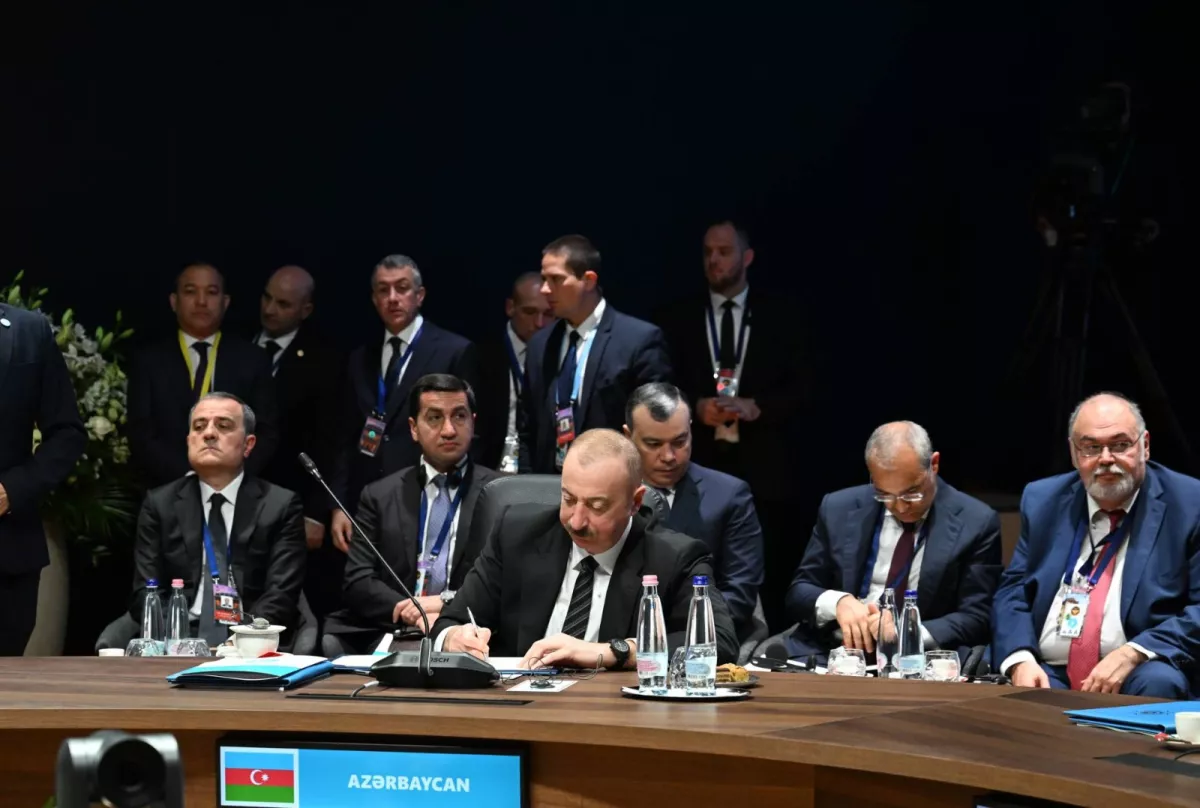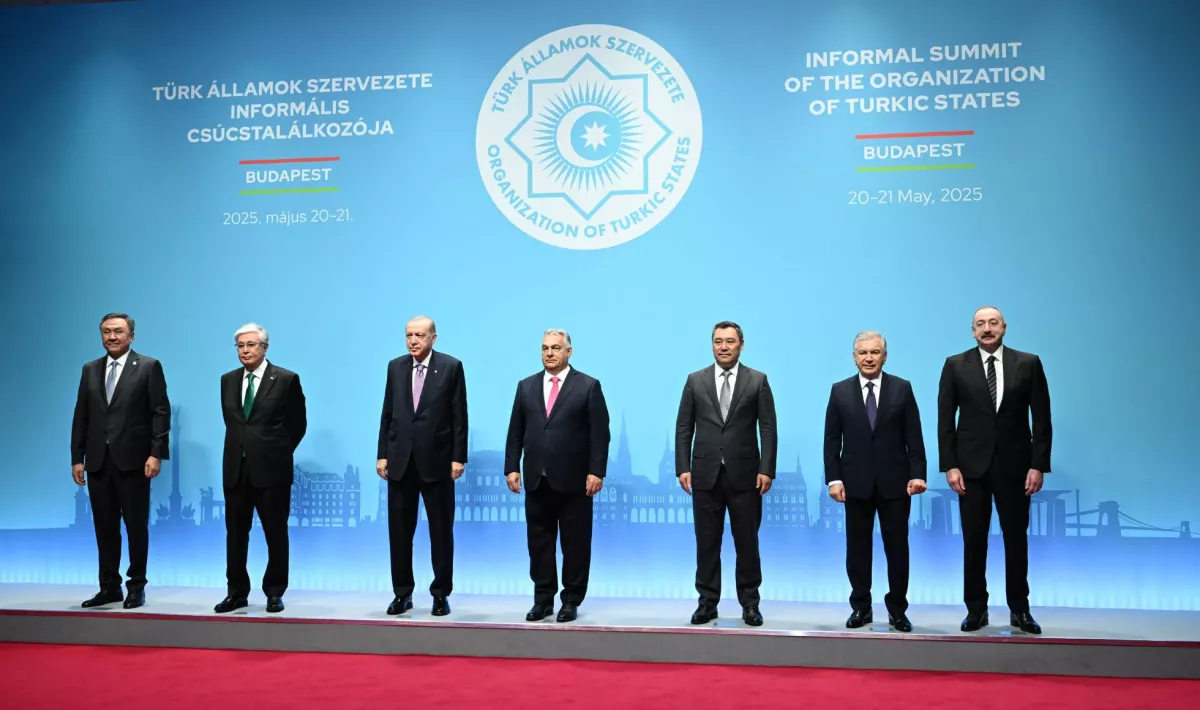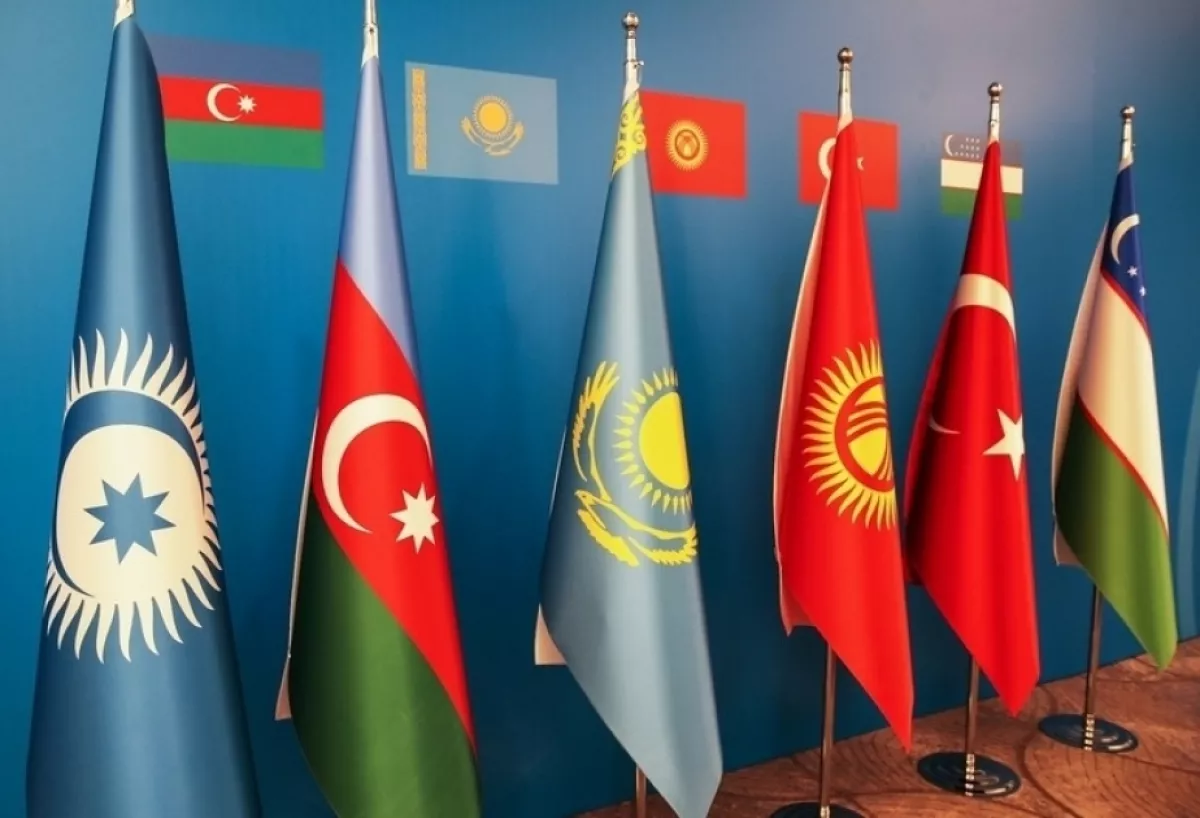Turkic world – shield and voice of Eurasia Afterword to the Budapest summit
What vast prospects the Organisation of Turkic States (OTS) indeed holds! At its core, in the words of the President of Azerbaijan, Ilham Aliyev, lies the fact that the Turkic world is a single family encompassing significant geography, territory, military power, economy, natural resources, transport routes, and a growing population of peoples sharing common roots. Therefore, the members of this unified community must contribute to establishing the OTS as an important centre of power on the global stage.
We highlight these points because at the informal OTS summit held recently in Budapest, many important ideas were voiced regarding the development of the organisation, and a historic Declaration was adopted containing landmark provisions. Before examining some of its specific details, it is worth recalling that the “Karabakh Declaration,” adopted just under a year ago at the informal OTS summit in Shusha, stated that given the presence of geopolitical challenges worldwide, including in the field of security, the most crucial aspect is the consolidated position of the Turkic states. In this light, the document emphasised the importance of creating appropriate transport infrastructure and effective transregional corridors, including the digitalisation of transport and transit procedures.

At the Budapest forum, the heads of the OTS member states effectively presented a report on their activities in the outlined direction, also outlining the next steps. Opening the summit, Hungarian Prime Minister Viktor Orbán emphasised how relations between Budapest and the OTS member countries have gained special significance. Following this, nearly all the leaders gathered in Budapest highlighted the importance of the Middle Corridor (along with its digitalisation) and transport cooperation in general, where Azerbaijan, according to President Ilham Aliyev, has become one of Eurasia’s key transport and logistics hubs. Against this backdrop, particular importance is given to the positioning of the OTS by Turkish President Recep Tayyip Erdoğan as a connecting bridge between East and West, with the strategic significance of the South Caucasus for the entire Turkic world coming into sharp focus.
In turn, the President of Kazakhstan, Kassym-Jomart Tokayev, highlighted the significant strengthening of the Turkic region’s position as a key transit hub and expressed gratitude to President Ilham Aliyev for supporting Kazakhstan’s efforts to increase oil exports.
The President of Uzbekistan, Shavkat Mirziyoyev, placed special emphasis on the importance of finalising the “Treaty on Strategic Partnership, Eternal Friendship, and Brotherhood of Turkic States,” with the prospect of signing it at the upcoming 12th OTS Summit in Baku in 2025. In harmony with this, he spoke in favour of the initiative to create the online platform “TURK-TRADE,” including the implementation of “single window” systems and “green corridors.”
The President of Kyrgyzstan, Sadyr Japarov, expressed confidence that the implementation of the Digital Partnership Agreement and the launch of the Turkic Investment Fund will significantly strengthen cooperation.

On this note, we can now turn to the Budapest Declaration adopted at the informal OTS summit in Hungary. First and foremost, the heads of state reaffirmed their commitment to the spirit of the Nakhchivan Agreement and focused on the Organisation’s role in ensuring global peace, security, and sustainable development.
In this context, it is worth recalling that the Agreement adopted in Nakhchivan in 2009 established the foundation of today’s OTS (then known as the “Cooperation Council of Turkic-Speaking States”), based on historically rooted ties, shared language, culture, and traditions of the member peoples. Its goals included creating favourable conditions for trade and investment, promoting the rich cultural and historical heritage of the Turkic peoples, and more.
In other words, the 2009 Agreement brought into focus those very principles which, having evolved over the past 15 years, were echoed in the discussions held in Budapest. The original signatories of the 2009 document were Azerbaijan, Kazakhstan, Kyrgyzstan, and Türkiye. In 2018, Uzbekistan became a full member of the Council, while Hungary was granted observer status. In 2021, the Council was renamed the Organisation of Turkic States (OTS), with Turkmenistan joining as an observer. In 2022, the Turkish Republic of Northern Cyprus (TRNC) also joined the OTS as an observer.
Returning to the Budapest Declaration, it is worth noting that it reflects the significance of the “Charter of the Turkic World”. In this regard, it is important to highlight the Charter’s emphasis on the fact that the countries of the Turkic world are united “not only by a glorious past, but also by a shared vision of the present and future in a wide geography” — extending to Europe, the Black Sea region, the Balkans, and the Mediterranean.
The Charter outlines objectives such as the further development of cooperation based on Turkic identity, the promotion of common history, culture, and traditions, among other priorities. It also emphasises that strengthening a shared Turkic identity must go hand in hand with “encouraging multiculturalism.”
At the same time, the Declaration adopted in Budapest specifically underlined the need to reinforce solidarity among Turkic states, including the active engagement of observer countries — Hungary, Turkmenistan, and the Turkish Republic of Northern Cyprus (TRNC). In this context, President Ilham Aliyev recalled back in April 2025 that Azerbaijan had played a key role in facilitating the TRNC’s observer status within the OTS. At the invitation of the Azerbaijani leader, President Ersin Tatar participated in the informal OTS summit in Shusha.
“We don't have any other agenda,” President Aliyev emphasised, “other than how we can be helpful to our brothers in Northern Cyprus, who deserve to have their own state.”

In a separate clause, the Budapest Declaration reaffirmed the commitment of the OTS member states to combating terrorism, transnational organised crime, and cybercrime. The participants also highlighted Türkiye’s pivotal role as a powerful actor in fostering an atmosphere of security and stability in Syria, as well as in advancing the issue of lifting sanctions on Damascus.
In parallel, the Declaration expressed the signatories’ deep concern over the humanitarian situation in Gaza. It reaffirmed their support for the negotiation process aimed at achieving a full and lasting ceasefire, the release of hostages and detainees, and the delivery of humanitarian aid to Gaza.
In a separate clause, the sides expressed their support for expanding cooperation in the field of defence industry and for joint efforts on the international stage to counter manifestations of Islamophobia, racism, xenophobia, and disinformation. In light of this, one is reminded of President Ilham Aliyev’s address at the 11th OTS Summit of Heads of State in Bishkek in 2024, where he emphasised that in the face of growing global threats, “our cooperation in the fields of defence, security, and the defence industry” is of critical importance.
Continuing in this vein, it is worth noting the announcement by OTS Secretary General Kubanychbek Omuraliev that the first meeting of heads of defence enterprises from Turkic states is scheduled for the summer of 2025, to be followed by preparations for the inaugural meeting of the defence ministers of the Turkic states.
The Declaration also placed special emphasis on the success of the “Baku Process” and Azerbaijan’s leading role in promoting intercultural dialogue. It reaffirmed support for the 7th World Forum on Intercultural Dialogue, scheduled to take place in Baku in 2026. It should be recalled that the “Baku Process” was launched at the initiative of President Ilham Aliyev in 2008, with the aim of fostering intercultural and inter-civilisational dialogue.'

At the same time, the Declaration outlined the need to increase the Organisation of Turkic States’ (OTS) budget and to launch the project activities of the Turkic Investment Fund. It also highlighted the importance of achieving tangible results in key areas such as green energy, the development of sustainable infrastructure, and the entry into force of the Agreement on the establishment of a simplified customs corridor among member states.
In this context, it is worth noting President Ilham Aliyev’s statement in Budapest, in which he emphasised that Azerbaijan has invested over $20 billion across OTS member states.
The Declaration also acknowledged Baku’s success in securing the right to host COP29, and addressed matters of cultural heritage—including during times of armed conflict—as well as youth and sports policy, and the development of cultural and humanitarian ties.
The participants of the Budapest Informal Summit expressed their support for the upcoming 12th Summit of the Organisation of Turkic States (OTS), scheduled to take place in Azerbaijan in 2025. They also acknowledged the nomination of OTS member states’ candidates for key positions within the United Nations, UNESCO and ECOSOC.
Moreover, while commending Kyrgyzstan’s chairmanship and Hungary’s active role in strengthening multilateral cooperation within the OTS, the leaders extended their gratitude to Prime Minister Viktor Orbán for his support of Turkic solidarity, and to the Hungarian people and government for their warm hospitality.
It is evident that the ideas put forward by President Ilham Aliyev throughout various stages of the OTS’s development were clearly reflected in the Budapest Declaration. This prompted Secretary-General Kubanychbek Omuraliev to note how rapidly the OTS has evolved over the past 15 years into “a dynamic and purposeful regional structure.” He particularly highlighted Azerbaijan’s central role in advancing trade, transport, and communication across the Turkic world.
The stage is now set for the 12th OTS Summit in Azerbaijan.








